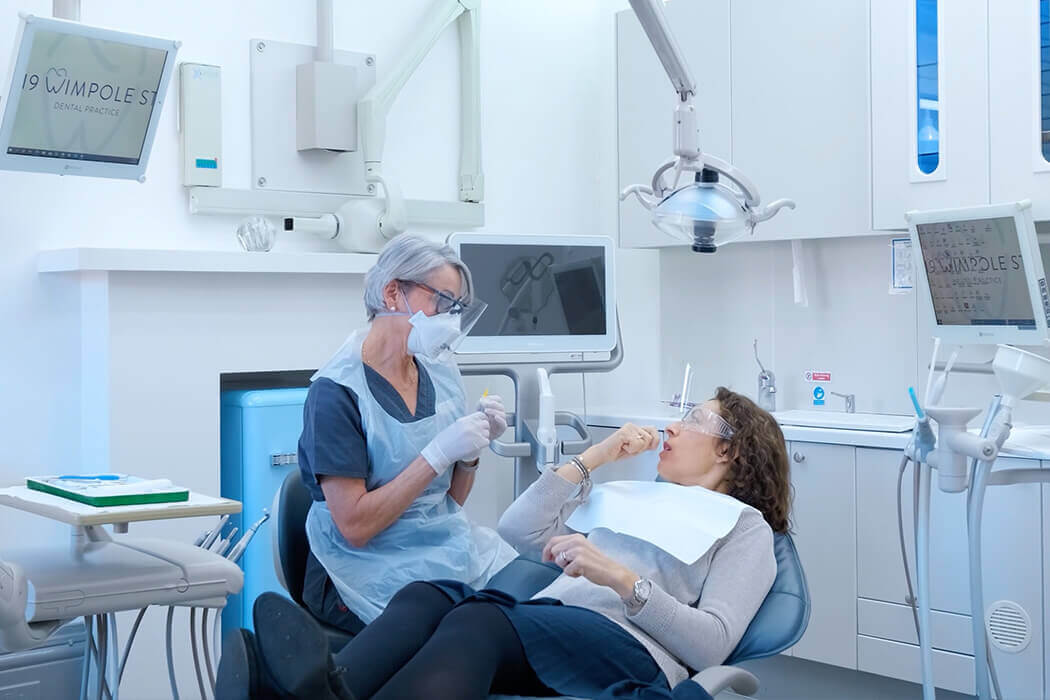Dental Crowns & Bridges
Crowns and Bridges in Marylebone at 19 Wimpole Street Dental Practice
When teeth need repairing or replacing, crowns and bridges can be an ideal solution. Durable yet discreet, these restorations not only restore the function of your teeth but also help boost your confidence and self-esteem.
At our dental practice on Wimpole Street in Marylebone, part of London’s prestigious medical district, our crowns and bridges are carefully matched to your surrounding teeth for a natural, seamless result.
Typically, a crown is used to restore an existing tooth that has been chipped, fractured, or weakened, while a bridge spans the gap created by missing teeth, anchored by crowns on either side for stability and functionality.
For more information on dental crowns & bridges or to book a consultation, get in touch with 19 Wimpole Street Dental Practice in Marylebone, London, via our contact form or by calling us on: 020 7580 2720

Your Crowns & Bridges Journey
1. Consultation for Crowns & Bridges
At our dental practice in Marylebone, your first step of any treatment plan is an in-depth consultation, as it helps us to assess your smile, allows us to look over your dental history, and ensures you can discuss your treatment in advance – with absolutely no commitment.
2. Treatment
The next stage of the process is to create and fit your new crown or bridge. A bridge involves some preparation (gentle filing) of the surrounding teeth, which serve as anchor points. Preparation on all surfaces of the tooth is also needed in the case of a crown, which is adhered to the damaged tooth. An anaesthetic is administered to help manage any discomfort.
Types of bridges include cantilever (where a missing tooth is supported by an existing tooth at one side), Maryland (which involves a ‘wing’ being bonded to the teeth next to the missing tooth) and implant-supported bridges (a permanent solution, using dental implant technology).
3. Aftercare
At our dental practice, we are committed to dental excellence – so in our minds, the treatment doesn’t end when we put down our tools. With crowns, you should be able to have the same diet as before, but may need to avoid hard, chewy foods at first. Bridges aren’t fixed to the teeth, so ongoing aftercare for these will involve cleaning the mouth and apparatus.
Your questions answered
about crowns & bridges at 19 Wimpole Street Dental Practice
Crowns and bridges are restorative dental treatments used to repair or replace damaged or missing teeth. A crown is a cap placed over a weakened or broken tooth to restore its strength and appearance, while a bridge spans the gap left by one or more missing teeth, anchored by crowns on the surrounding teeth.
For crowns, advantages include a natural-looking solution for tooth damage that is long-lasting, while helping to restore bite and chew function. Crowns also protect against fractures and preserve the strength and functionality of the tooth. Disadvantages are that some adjustments may be needed for diet or habits to preserve the crown (especially if you chew ice or objects like pen lids).
For bridges, advantages include a quick, cost-effective and sturdy solution for tooth loss. They can also help prevent the teeth from shifting in the mouth, which helps preserve the bite. However, there are some disadvantages. The apparatus is anchored onto two healthy teeth which need to be prepared (gently filed) for the bridge to stay in place. In addition, a bridge doesn’t correct bone loss in the jaw.
Finally, both crowns and bridges may need replacing in the future.
Most patients with damaged, weakened, or missing teeth are suitable candidates for crowns or bridges. At our Marylebone dental practice, our dentists will examine your teeth and gums to recommend the best option for restoring your smile.
With good oral hygiene and regular dental check-ups, crowns and bridges can last 10–15 years or more. Their longevity depends on the materials used, your bite, and daily habits such as diet and oral care routines.
If the tooth can’t be saved, a dental implant may be recommended. These are false teeth that are implanted into the jaw bone and are both strong and realistic.
Why Choose Us For Crowns & Bridges
Our practice combines advanced restorative dentistry with personalised care to restore both the function and appearance of your smile. Whether you need a crown to protect a weakened tooth or a bridge to replace a missing one, we design solutions that feel natural and work beautifully.
Meet The TeamBook Your Crowns & Bridges Consultation
Want to restore your bite and enhance your smile’s appearance? Fill out the form to arrange your crowns & bridges consultation with our experienced team.




